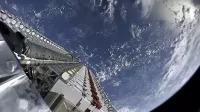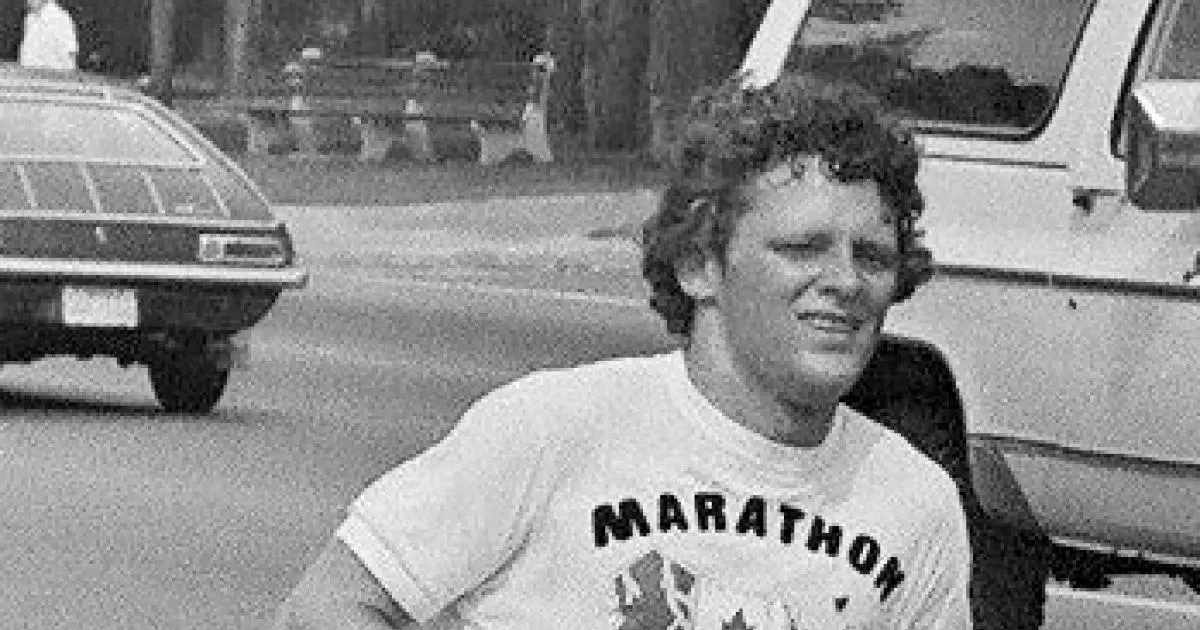Terry Fox was a Canadian athlete and cancer research activist who gained international recognition for his Marathon of Hope in 1980. After losing a leg to cancer, he ran across Canada for 143 days, covering 5,373 kilometers, to raise money and awareness for cancer research. His journey, cut short by the spread of cancer that ultimately took his life, had a profound impact, inspiring the annual Terry Fox Run. Established in 1981, the event unites millions of participants across over 60 countries, becoming the world's largest one-day fundraiser for cancer research. To date, over C$850 million has been raised in his name.
July 28, 1958: Birth of Terry Fox
Terry Fox, a Canadian athlete, humanitarian, and cancer research activist, was born on July 28, 1958.
1966: The Fox Family Moves to Surrey, BC
In 1966, Terry Fox's family relocated to Surrey, British Columbia, marking a change in scenery for the future athlete.
1968: Settling in Port Coquitlam
The Fox family settled in Port Coquitlam in 1968, where Terry's athletic journey began to take shape.
1974: Mark Kent Runs Across Canada
In 1974, before Terry Fox's Marathon of Hope, Mark Kent accomplished the feat of running across Canada. Kent's run was aimed at raising funds for the Canadian team participating in the 1976 Summer Olympics.
November 12, 1976: Car Accident and Knee Injury
On November 12, 1976, Terry Fox was in a car accident that injured his right knee, an event that would later be linked to his cancer diagnosis.
March 1977: Osteosarcoma Diagnosis and Leg Amputation
In March 1977, Terry Fox was diagnosed with osteosarcoma, a type of bone cancer, and underwent a leg amputation. His determination and positive attitude during this time were remarkable.
1977: Terry Fox's Leg Amputation and Continued Athleticism
After being diagnosed with osteosarcoma, Terry Fox's right leg was amputated in 1977. Despite this setback, he persevered, continuing to run with an artificial leg and playing wheelchair basketball.
1977: Rick Hansen Recruits Terry Fox for Wheelchair Basketball
In 1977, Rick Hansen, a Canadian Paralympic athlete, recruited Terry Fox to join his wheelchair basketball team. This encounter would later inspire Hansen's own incredible journey, the Man in Motion World Tour.
1977: Introduction to Wheelchair Basketball
Terry Fox began playing wheelchair basketball in 1977, demonstrating his resilience and passion for sports despite facing physical challenges.
1978: Isadore Sharp's Support for Terry Fox
Isadore Sharp, CEO of Four Seasons Hotels and Resorts, offered significant support to Terry Fox's Marathon of Hope in 1978, inspired by his own son's battle with cancer.
September 2, 1979: 17-Mile Road Race and Revelation of the Marathon of Hope Plan
On September 2, 1979, Terry Fox participated in a 17-mile road race, finishing last but inspiring others with his determination. He later shared his plan for the Marathon of Hope with his family.
October 15, 1979: Letter to the Canadian Cancer Society
On October 15, 1979, Terry Fox sent a powerful letter to the Canadian Cancer Society outlining his goal for the Marathon of Hope and seeking funding.
April 12, 1980: The Marathon of Hope Begins
Terry Fox's Marathon of Hope began on April 12, 1980, marked by the symbolic dipping of his artificial leg in the Atlantic Ocean.
September 1980: Recognition and Honours
In September 1980, Terry Fox received numerous accolades for his Marathon of Hope, including being appointed a Companion of the Order of Canada, receiving the Order of the Dogwood, and being named Canada's Newsmaker of the Year.
1980: Marathon of Hope in Toronto
In 1980, Terry Fox arrived in Toronto during his Marathon of Hope, where he was greeted by a crowd of 10,000 people and joined by supporters, including NHL star Darryl Sittler. The event raised an estimated $100,000 in donations for cancer research.
1980: Terry Fox Embarks on the Marathon of Hope
In 1980, Terry Fox, with one leg amputated due to cancer, began his Marathon of Hope, a cross-Canada run to raise money and awareness for cancer research.
1980: Terry Fox: Canada's Newsmaker and Top Sportsman
Terry Fox was named Canada's Newsmaker of the Year and won the Lou Marsh Award as the nation's top sportsman in 1980, highlighting his national impact.
1980: Marathon of Hope Gains National Attention
Terry Fox's Marathon of Hope, a cross-country run to raise money for cancer research, began in 1980 and quickly gained national attention, turning him into a national star.
1980: Wheelchair Basketball Success and Recognition
Terry Fox's dedication to wheelchair basketball led him to win three national titles and earn recognition as an all-star by the North American Wheelchair Basketball Association in 1980.
June 19, 1981: Terry Fox's Final Battle and Passing
On June 19, 1981, Terry Fox was readmitted to the hospital with chest congestion and pneumonia. He tragically passed away on June 28, 1981. His death was marked by national mourning, with flags lowered to half-mast in his honor.
June 28, 1981: Death of Terry Fox
On June 28, 1981, Terry Fox succumbed to cancer after his Marathon of Hope. His legacy continues to inspire millions worldwide.
September 13, 1981: First Terry Fox Run
The inaugural Terry Fox Run took place on September 13, 1981, organized by Isadore Sharp, the Four Seasons Hotels, and the Fox family. The event aimed to raise funds for cancer research in Terry's name.
1981: Terry Fox: Posthumous Recognition as Canada's Newsmaker
Even after his passing, Terry Fox's impact continued to resonate, earning him the title of Canada's Newsmaker of the Year in 1981.
1981: Posthumous Recognition and Tributes
Following his death in 1981, Terry Fox was honored with the Newsmaker of the Year award, and Canada Post announced a commemorative stamp in his memory, breaking tradition. Musician Rod Stewart dedicated a song to Fox and named his Canadian tour after him.
September 19, 1982: National School Run Day
On September 19, 1982, the second Terry Fox Run encouraged school participation, establishing the tradition of National School Run Day.
1982: Terry Fox Canadian Youth Centre
In 1982, the Terry Fox Canadian Youth Centre was established in Ottawa, offering a space for high school students to learn about Canada.
1983: The Terry Fox Story Film Released
The Terry Fox Story, a biographical film about Fox's life, was released in 1983. Produced by Home Box Office, it was aired as a television movie in the United States and had a theatrical release in Canada. The film starred Eric Fryer, an amputee actor, as Fox and Robert Duvall. Notably, it was the first film produced exclusively for pay television. Although it received mixed but generally favorable reviews, Fox's family expressed criticism about the film's portrayal of his temper. The Terry Fox Story was nominated for eight Genie Awards and won five, including Best Picture and Best Actor.
1984: Steve Fonyo Embarks on "Journey for Lives" Run
In 1984, Steve Fonyo, inspired by Terry Fox, embarked on his own cross-Canada run, known as the "Journey for Lives." Fonyo, who also had the same form of cancer and had undergone a leg amputation, sought to complete what Fox had started.
1984: Ian Thomas and Manfred Mann's Earth Band Release Songs Inspired by Terry Fox
Inspired by Terry Fox's story, rock musician Ian Thomas wrote and recorded the song "Runner." This song was featured in "The Terry Fox Story" film. In 1984, Manfred Mann's Earth Band covered "Runner," achieving significant success as it reached number 22 on the Billboard Hot 100 chart.
May 29, 1985: Steve Fonyo Completes Cross-Canada Run Inspired by Terry Fox
On May 29, 1985, Steve Fonyo, an 18-year-old who, like Fox, had experienced the same type of cancer and leg amputation, completed his cross-Canada run, which he called the "Journey for Lives." Fonyo's journey began on March 31, 1984, and he reached the spot where Fox's run ended in November of that year. The "Journey for Lives" was a testament to Fox's enduring impact and raised over $13 million for cancer research.
1985: Rick Hansen Begins Man in Motion World Tour
In 1985, inspired by Terry Fox, Rick Hansen began his Man in Motion World Tour, aiming to raise funds and awareness for spinal cord injuries. This endeavor showcased the ripple effect of Fox's legacy, motivating others to take on challenges and make a difference.
May 1987: Rick Hansen Completes Man in Motion World Tour
In May 1987, Rick Hansen, a Canadian Paralympic athlete, completed his remarkable Man in Motion World Tour. Inspired by Terry Fox's Marathon of Hope, Hansen, who had recruited Fox to his wheelchair basketball team in 1977, embarked on this journey in 1985. Hansen's goal was to raise $10 million for spinal cord injury research. His tour spanned 792 days, covering 40,073 kilometers (24,900 miles) across 34 countries. Like Fonyo, Hansen paused to honor Fox at the location where Fox's run ended. Hansen's efforts resulted in raising over $26 million, highlighting the widespread impact of Fox's legacy.
1994: Establishments in Terry Fox's Honor
In 1994, the Terry Fox Hall of Fame was founded to acknowledge individuals improving the lives of disabled people. The Terry Fox Laboratory, a research center dedicated to cancer research, was also established in Vancouver.
1999: Recognized as Canada's Greatest Hero
A national survey conducted in 1999 named Terry Fox as Canada's greatest hero.
1999: Terry Fox Run Goes Global
By 1999, the Terry Fox Run had become an international event, with over a million participants in 60 countries raising $15 million for cancer research.
2004: The Greatest Canadian
In 2004, Terry Fox was recognized as the second Greatest Canadian in a CBC program, highlighting his enduring impact on the nation.
2005: Terry, a Film Focused on the Marathon of Hope, Premieres
In 2005, CTV Television Network produced "Terry," a second movie about Fox, this time focusing on his Marathon of Hope. Shawn Ashmore played the role of Fox. As Ashmore is not an amputee, digital editing was used to superimpose a prosthesis over his leg. Unlike the first film, "Terry" received endorsement from Fox's family and offered a more positive depiction of his attitude.
2005: Commemorative Dollar Coin
In 2005, the Royal Canadian Mint issued a special dollar coin to mark the 25th anniversary of Terry Fox's Marathon of Hope, making him the first Canadian featured on a regular circulation coin.
2008: Terry Fox Named a National Historic Person of Canada
In 2008, Terry Fox was posthumously named a National Historic Person of Canada. This prestigious recognition is given by the Canadian government to individuals who have made significant contributions to the country's history. Fox received this honor for his enduring legacy as an icon, his remarkable personal qualities, and the profound impact his Marathon of Hope had on Canada, captivating the nation and deeply resonating with Canadians.
2010: Betty Fox Carries Olympic Flag and Terry Fox Award Introduced at 2010 Winter Olympics
At the opening ceremony of the 2010 Winter Olympics in Vancouver, Betty Fox, Terry Fox's mother, was chosen as one of the eight individuals to carry the Olympic Flag into BC Place Stadium. Additionally, the Terry Fox Award was introduced at these games, honoring Olympic athletes who exemplify Fox's admirable traits of determination and humility when facing adversity.
2010: Steve Nash Directs ESPN Documentary About Terry Fox
Canadian NBA star Steve Nash, deeply inspired by Fox in his own youth, directed a documentary titled "Into the Wind" in 2010. This documentary, aired on ESPN as part of its acclaimed "30 for 30" series, offered another perspective on Fox's enduring legacy.
2012: Induction into Canadian Medical Hall of Fame
Terry Fox was posthumously inducted into the Canadian Medical Hall of Fame in 2012, recognizing his immense contribution to medical research fundraising.
2015: Manitoba Establishes Terry Fox Day
Starting in 2015, Manitoba officially designated the first Monday in August, previously known as Civic Holiday, as Terry Fox Day. This decision further solidified Fox's legacy and his importance in Canadian culture.
2016: Marathon of Hope: The Musical Debuts
Further solidifying Terry Fox's place in cultural history, "Marathon of Hope: The Musical," produced by Drayton Entertainment, premiered in 2016, bringing his inspiring story to the stage.
September 13, 2020: Google Doodle Honors Terry Fox
On September 13, 2020, Google paid tribute to Terry Fox by featuring him in a Google Doodle, commemorating his enduring impact and inspiring story.
May 2022: Terry Fox Run's Impact
As of May 2022, the Terry Fox Run stands as the world's largest one-day fundraiser for cancer research, raising over $850 million in his name.
September 2022: Terry Fox's Legacy: Over C$850 Million Raised
As of September 2022, the annual Terry Fox Run has raised over C$850 million for cancer research, a testament to his enduring impact.
Mentioned in this timeline

Basketball is a team sport played on a rectangular court...

Google LLC is a multinational technology company specializing in online...

The Billboard Hot is the primary music chart in the...

Steve Nash is a retired Canadian professional basketball player and...

A car also known as an automobile is a wheeled...
Canada is a North American country the second largest in...
Trending
47 minutes ago Tim NeCastro Announces Retirement as Erie Insurance CEO After 10 Years

3 hours ago Apple MacBook Pro: Touchscreen, Dynamic Island, and New Interface Coming Soon.

3 hours ago Microsoft and SpaceX Starlink Partner to Empower Global Community Internet and AI Economy
47 minutes ago Trump Announces Energy Deals and Rate Payer Protection Pledges at SOTU
3 hours ago Whitefox & Fluid Quip collaborate; Low-carbon ethanol boosted; Indoor plants aid climate resilience.

2 hours ago Ethereum Price Faces Resistance at $1,950 Amidst Market Repricing Concerns.
Popular

Jesse Jackson is an American civil rights activist politician and...

Susan Rice is an American diplomat and public official prominent...

Barack Obama the th U S President - was the...

Michael Joseph Jackson the King of Pop was a highly...

XXXTentacion born Jahseh Dwayne Ricardo Onfroy was a controversial yet...

Bernie Sanders is a prominent American politician currently serving as...
